After recently expressing hopes of restarting peace talks to end the Sudan war at the end of Ramadan, the US has stated that the start date for such talks has been pushed back to an unknown date. The pushback comes just a few days before the one year mark of the Sudan war.
Peace Delayed
Close to the end of March, the US’ Special Envoy to Sudan, Tom Perriello, announced that the US was hoping to resume peace talks, aimed at ending the war in Sudan, “as soon as Ramadan is over.” No date was set for the talks at the time of the envoy’s announcement.
Following the initial announcement, Perriello announced that the US was looking to begin the talks on April 18th. However, Perriello has now stated that the talks were “unlikely” to resume on the 18th, without offering any alternative dates for when they may begin. Perriello did not say the reason for why the date may have changed.
The delay comes just a few days before the Sudan war is hitting its one year mark on April 15th. On the same day, France is to host a humanitarian conference in Paris. The conference’s goal is to drum up funding in order to support humanitarian initiatives in Sudan, initiatives which go drastically underfunded. Perriello claimed that humanitarian initiatives in Sudan were at a mere 5% of the funding that they needed in order to properly assist Sudan, which is experiencing the world’s largest internal displacement crisis, and one of the world’s largest hunger crises.
“The international response has been pitiful. We’re at 5% of the needed amount” -US Special Envoy to Sudan, Tom Perriello
Perriello, alongside the US’ Ambassador to the UN, Linda Thomas Greenfield, has urged the nations of the world to donate funds to the Paris conference, as well as to give more importance to the Sudan war.
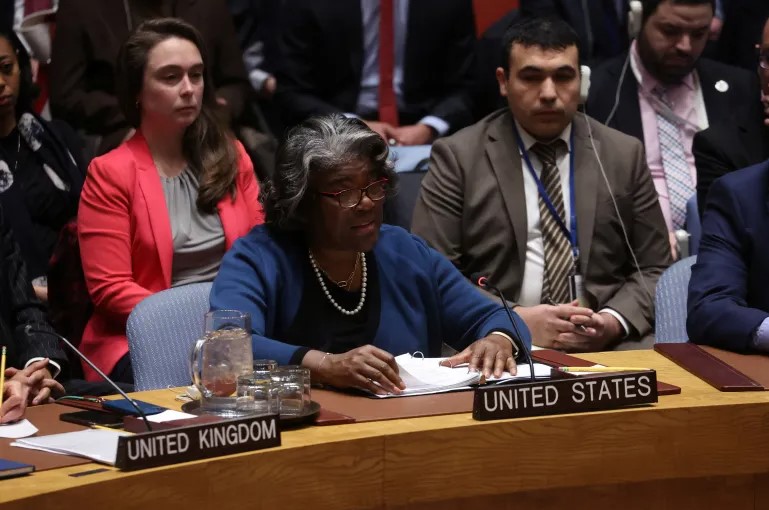
Perriello added that the US was not waiting for formal talks to begin, stating that negotiations between the US and warring parties were taking place every day. He further stated that Saudi Arabia, the nation that will be hosting the eventual talks, was committed to the talks.
“We would love frankly for the talks to have started last week. But what we know is the Saudis are committed to the talks, to talks that include a broader set of the key actors, and we are hoping that they will commit to a date” -US Special Envoy to Sudan, Tom Perriello
Perriello stated that the US will “be doing another nine-figure push around this” concerning funding for humanitarian initiatives in Sudan, though he did not name a specific number.
The eventual talks will be hosted in Jeddah, Saudi Arabia, where previous peace talks had taken place earlier in the war.
An Expanding War
Although the war in Sudan originally began between the Sudanese Armed Forces (SAF) and the paramilitary Rapid Support Forces (RSF), several militias within the country have since joined the war on both sides, declaring allegiance to either the SAF or the RSF.
Thursday, April 11th, witnessed yet another expansion of the war as the Joint Force of Armed Movements in Sudan, or the Joint Force, announced the end to their neutrality in the face of continued attacks by the RSF. The Joint Force is a grouping of several different Sudanese militias.
The Joint Force declared allegiance to the SAF and vowed to defend El Fasher, the regional capital of the North Darfur state, where it is based. The group claimed that it will fight alongside the SAF, and actively defend humanitarian aid deliveries, attacking anyone who might try to obstruct them.
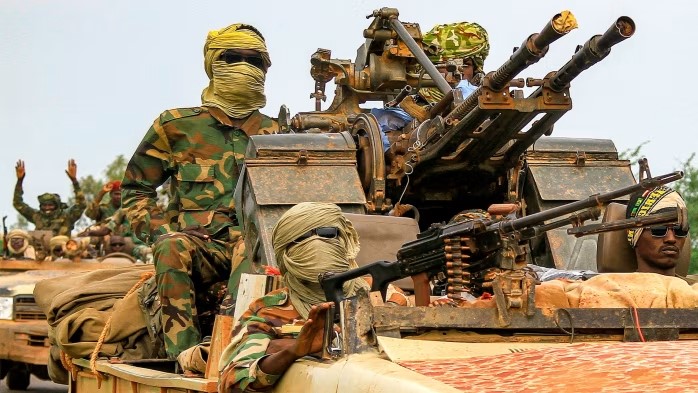
The Joint Force’s announcement comes after the RSF had announced plans to potentially block aid from reaching El Fasher on routes that they hold within their territory. It also comes as RSF troop movements have been reported in the area of El Fasher, leading some to think an attack may soon take place there.
Darfur, where the Joint Force is based, is primarily controlled by the RSF. Since the beginning of the war, it has served as one of their key basing grounds for operations and offensives against the RSF. It has also been the site of a number of ethnic based attacks by the RSF. The Joint Force stated their positions had previously been attacked by the RSF, suggesting they might have been the victim of some of these types of attacks.
The entry of the Joint Force into the war is just one of many expansions to the war. Fears have been growing that the war could expand into a general regional war, as more and more parties become tied to the conflict in some sort of way. The US has denounced any foreign support of either side of the war, stating that any support to either the SAF or the RSF only serves to extend the war.
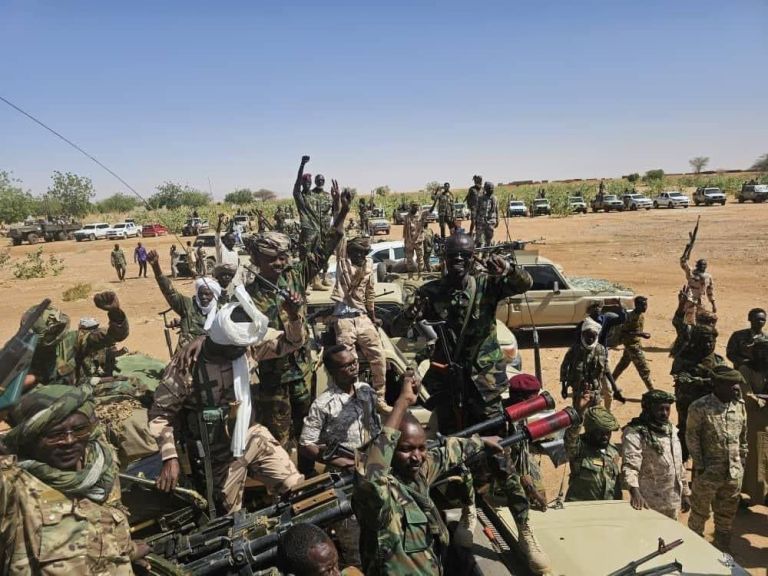
The Talks
There is no set date for when talks will resume. Not very many details are known about the talks; however the US has said they will be “inclusive.” Future talks will reportedly involve the AU, the Intergovernmental Authority on Development (IGAD, an East African economic bloc of which Sudan is a member), the US, Saudi Arabia, Egypt, and the UAE.
Notably, the UAE has been accused of supplying the RSF, which they deny. Additionally, Egypt has aligned itself with the SAF, and supplied them over the course of the war. The inclusion of the UAE and Egypt in the talks is likely due to their essential direct involvement in the war.
The talks in Jeddah will build upon previous peace initiatives by Saudi Arabia and the US. Not long into the war, Saudi Arabia and the US facilitated several different talks in Jeddah, aimed at finding a peaceful resolution to the war.
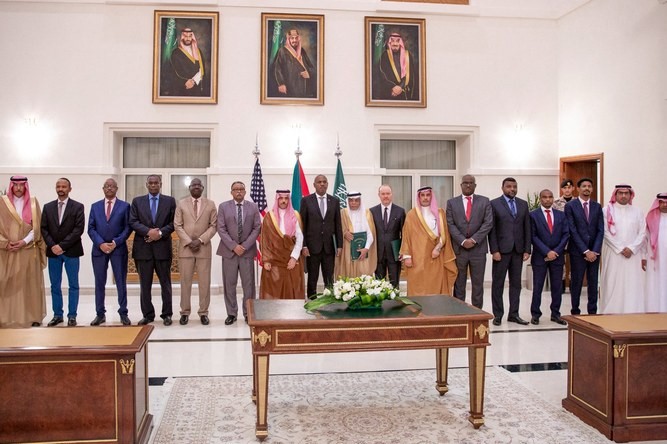
While multiple ceasefires and humanitarian pauses were established, they all have since been broken, sometimes within hours, and sometimes immediately.
Peace efforts have been complicated by a lack of cooperation on both sides. The SAF in particular has denied multiple different peace initiatives throughout the course of the war. Many believe this to be due to the fact that the SAF has found itself in a less advantageous position as the war has gone on, losing several significant territories to the RSF, who has gained a level of international legitimacy, legitimacy that the SAF is keen to deny them. However, the RSF is also guilty of rejecting peace processes, denying several attempts.
Both the RSF and the SAF recently rejected a UN Security Council resolution in early March that called for a ceasefire for the Islamic holy month of Ramadan.
The War in Sudan: One Year On
Sudan’s war is rapidly approaching the one year mark, having begun on April 15th, 2023. The war has seen significant portions of Sudan’s infrastructure damaged or destroyed, millions displaced, thousands killed, reports of rampant ethnic-based violence, and Sudan’s economy tank further than it already had been. The situation is worsened by the fact that Sudan had endured several years of civil conflict prior to the war’s beginning.
The war began between the SAF and the RSF due to disagreements on if/how the RSF should be integrated into the military, and power sharing agreements amidst the long process of transitioning into a civilian government.
Since the war’s beginning, Sudan has grown into the world’s largest internal displacement crisis. Approximately 8.5 million people are internally displaced within Sudan, the majority of whom (above six million) were displaced since the war began in April, with the remainder having been displaced in previous civil conflicts.
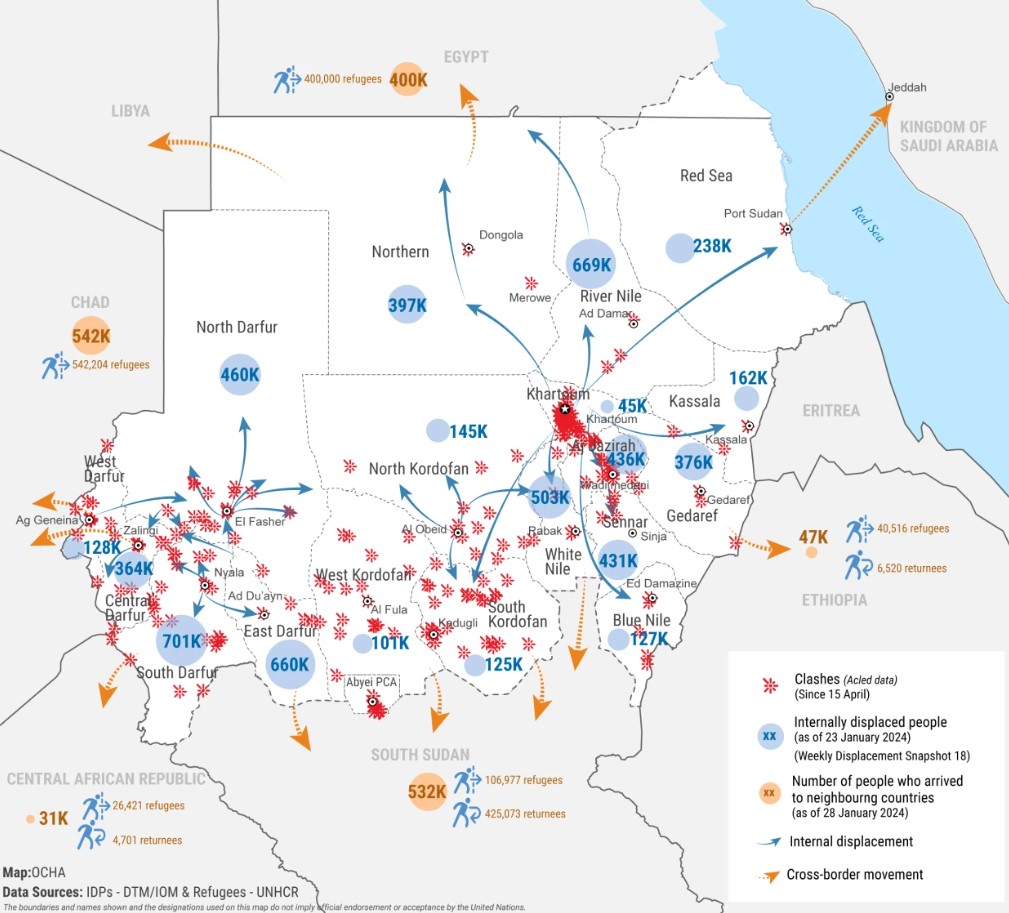
The 8.5 million are joined by nearly two million additional people that have fled Sudan completely, becoming refugees in neighbouring countries. This brings the total of displaced Sudanese civilians to approximately 10.5 million.
The war has also spawned with it an extensive humanitarian crisis. Prior to the war, significant portions of Sudan’s population were reliant upon humanitarian aid. Since the war began, this problem has only worsened, with approximately 18 million people within Sudan being food insecure. If Sudan, Chad, and South Sudan are grouped together, 25 million people are experiencing varying levels of food insecurity, representing a massive need for humanitarian aid.
Of Sudan’s 18 million, five million are experiencing emergency levels of hunger. The WFP has additionally stated that approximately 90% of those experiencing emergency levels of hunger are in areas that are simply inaccessible to the World Food Programme (WFP), meaning they are going entirely without aid.
Due to the lack of humanitarian aid that is entering Sudan, the WFP recently warned that the hunger crisis the nation is experiencing is threatening to become the world’s largest. If it does, this would not be the first time Sudan has held this title, as the hunger crisis experienced in Darfur, western Sudan, was the largest in the world 20 years ago.
In addition to a lack of proper funding and the heavy fighting throughout the nation, the WFP has additionally stated that “insecurity, restrictions, threats, roadblocks, and bureaucratic impediments” further harm humanitarian aid efforts.
Over the course of the war, at least 13,000 people (as of January 2024) have been killed. Casualty numbers are likely heavily underreported.
The UN has attributed ethnic violence to both sides, in particular to the RSF, who has reportedly carried out a number of massacres against civilian populations in Darfur. Darfur has a history of ethnic violence, and many of its populations have been targeted in Sudan’s previous conflicts as well.
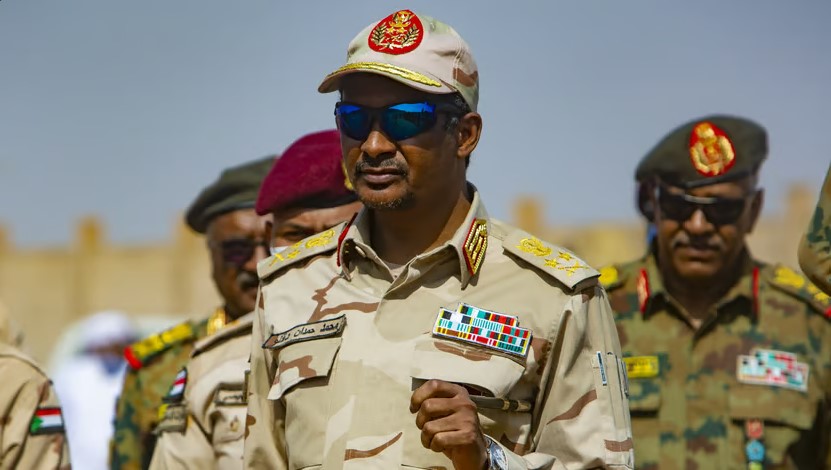
The US and the EU have implemented sanctions on a number of different Sudanese companies that are involved in the war in differing capacities.


